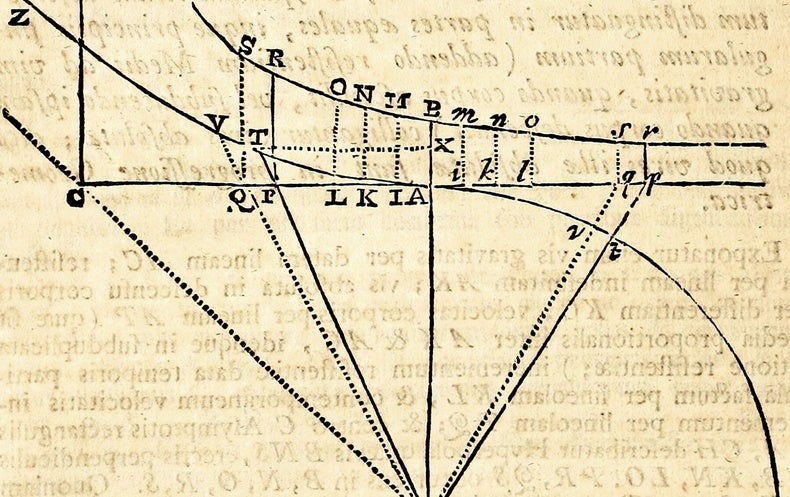A subtle mistranslation of Isaac Newton’s first law of motion that flew under the radar for three centuries is giving new insight into what the pioneering natural philosopher was thinking when he laid the foundations of classical mechanics.
The first law of motion is often paraphrased as “objects in motion tend to stay in motion, and objects at rest tend to stay at rest.” But the history of this rather obvious-seeming axiom about inertia is complicated. Writing in Latin in his 17th-century book Philosophiae Naturalis Principia Mathematica, Newton said, “Every body perseveres in its state of being at rest or of moving uniformly straight forward, except insofar as it is compelled to change its state by the forces impressed.”
Throughout the centuries, many philosophers of science have interpreted this phrasing to be about bodies that don’t have any forces acting upon them, says Daniel Hoek, a philosopher at Virginia Tech. For example, in 1965 Newton scholar Brian Ellis paraphrased him as saying, “Every body not subject to the action of forces continues in its state of rest or uniform motion in a straight line.” But that’s a bit puzzling, Hoek says, because there are no bodies in the universe that are free of external forces acting upon them. Why make a law about something that doesn’t exist?
In a recent paper published in the journal Philosophy of Science, Hoek argued that Newton had no intention of using the first law to refer to imaginary, force-free bodies. Newton’s use of the Latin for “except insofar” (nisi quatenus) was meant not to specify that the law referred only to such bodies, he said, but to point out that motion only changes insofar as a force compels it to. In other words, Hoek wrote, a better paraphrase would refer to all bodies: “Every change in a body’s state of motion is due to impressed forces.”
This difference might seem rather academic—after all, Newton’s theories have been superseded by Albert Einstein’s general theory of relativity. But Einstein built upon Newton, says Robert DiSalle, a historian of the philosophy of physics at Western University in Ontario. And people have used misinterpretations of Newton’s first law to argue that Einstein’s and Newton’s theories have fundamental philosophical disagreements, DiSalle says. In particular, there have been complaints that Newton’s first law is circular. It says that force-free bodies move in straight lines or stay at rest, but how do you know that they’re force-free? Well, it’s because they move in straight lines or stay at rest.
“The paper makes it easier to see why that point of view is wrong,” DiSalle says. Not only did Newton not intend to make a law about imaginary force-free bodies, DiSalle says, but his contemporaries didn’t interpret him that way, either. “I think it’s an interpretation that people thought up looking back,” DiSalle says.
Newton’s further writings make it quite clear he meant his first law to refer to all bodies, not just theoretical force-free ones, says George Smith, a philosopher at Tufts University and an expert in Newton’s writings. “The whole point of the first law is to infer the existence of the force,” Smith says. At the time Newton was writing, he says, it was not at all taken for granted that objects required a force to move them about; there were all sorts of old theories about objects having their own animating power. Aristotle, for example, thought that heavenly bodies were made of a theoretical form of matter called aether and naturally moved in circles. Newton was rejecting all of these older ideas in his writing, Smith says, and pointing out that there is no such thing as an object upon which no forces are acting.
The confusion over what Newton meant likely persisted because of a Latin-to-English translation made by Andrew Motte in 1729, after Newton’s death, that used the word “unless” instead of “except insofar.” This was a subtle difference that nonetheless made it seem like Newton was talking about force-free bodies instead of explaining why all bodies react to forces, Hoek says. After this, people “probably, for the most part, did not go back to the original translation,” he says.
The new explanation is more complete, says Ramón Barthelemy, a physics education researcher at the University of Utah. The words scientists use to convey their ideas can have a big impact on understanding, he says, especially for students. “I think it’s really fun that people are still out there talking about this,” Barthelemy says. “It shows that there is still discussion…. Any time we can provide more opportunities for students to engage and see a different interpretation, that’s an exciting way to get people involved in physics.”

